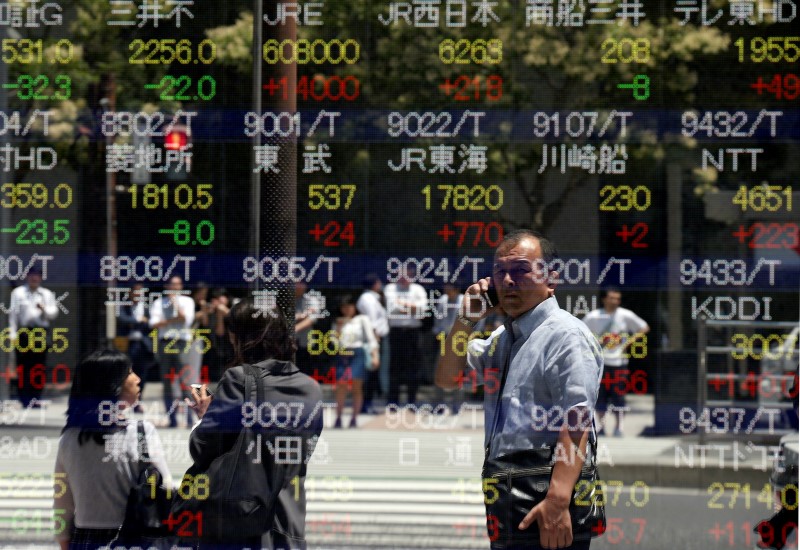By Shinichi Saoshiro
TOKYO (Reuters) - Asia stocks rose on Thursday, tracking an overnight rally on Wall Street, while the safe-haven Japanese yen was held in check as global markets regained a semblance of calm after the Brexit shock.
Spreadbetters forecast a slightly higher open for Britain's FTSE (FTSE), Germany's DAX (GDAXI) and France's CAC (FCHI).
MSCI's broadest index of Asia-Pacific shares outside Japan (MIAPJ0000PUS) rose 1.5 percent, pulling further away from a one-month low on Friday when it plunged more than 3 percent in reaction to Britain's decision to leave the European Union. The index has dropped about 0.8 percent in the April-June quarter.
Japan's Nikkei (N225) climbed 0.6 percent.
Following the market's initial panic over Brexit, "it doesn't look like it is spreading to a financial crisis or something serious, at least at this moment," said Hikaru Sato, senior technical analyst at Daiwa Securities in Tokyo.
Overnight, the Dow (DJI) rose 1.6 percent while Britain's FTSE (FTSE) rallied for the second day, letting the London benchmark retrace all of its losses right after the Brexit vote.
U.S. President Barack Obama said on Wednesday he expects the world economy will be steady in the short run after Britain's decision but expressed concern about longer-term global growth.
Still, expectations that major central banks will ease monetary policy in the wake of Brexit have buoyed risk assets globally.
Analysts also saw the recent plunge in sovereign debt yields as a factor driving investors to equities.
"While the full consequences of Brexit are still uncertain, the one thing it has accomplished very successfully is dropping global bond yields to new lows and keeping global monetary policy looser for longer," wrote Angus Nicholson, market analyst at IG in Melbourne.
"Negative yielding government debt has surged... in such a situation, the drive for yield has never been stronger, which has seen people piling into dip-buying with little thought for the fundamental picture."
German and Japanese benchmark 10-year government debt yields have both fallen to historic lows below zero over the past week. Irish, French and Dutch 10-year yields hit record lows on Wednesday, all approaching zero. [GVD/EUR]
The 30-year U.S. Treasury yield, while still positive, has approached record lows as well.
In currencies, the battered sterling came off multi-decade lows. The pound was last traded at $1.3399
The euro, another casualty in the days after Brexit, fetched$1.1105
The dollar was little changed at 102.770 yen
Precious metals rose in part due to a weaker dollar, although the gains also highlighted underlying investor appetite for safe assets amid longer-term financial uncertainty after Brexit.
Silver hovered near a 1-1/2-year high touched Wednesday, while platinum and palladium stood tall after rallying more than 3 percent overnight. Spot gold
Crude oil prices retraced some of their gains from Wednesday's sharp rally as fears over strike outages in Norway abated. Brent crude (LCOc1) was down 1.2 percent at $50.00 a barrel after jumping more than 4 percent overnight, thanks to a larger-than-expected drawdown in U.S. crude inventories. [O/R]

Oil has mostly recovered what it lost after the Brexit shock. For the quarter, Brent has risen 26 percent on hopes that declining production in some countries would ease a global glut.